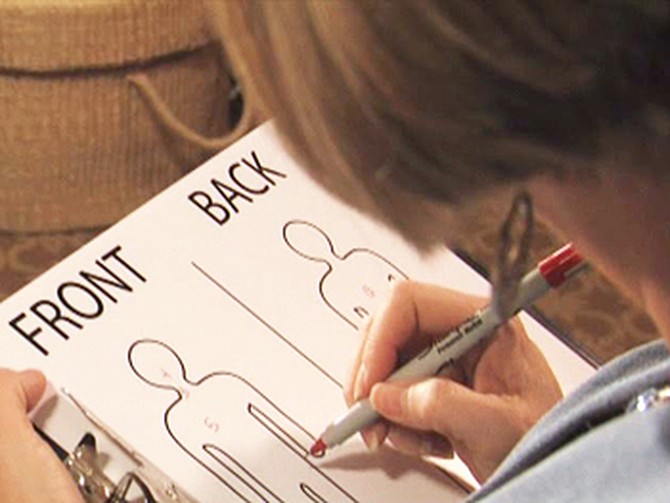Live Your Best Sex Life

Are you living your best life in the bedroom? If the passion has fizzled in your relationship, sex therapist Dr. Laura Berman has developed a step-by-step plan to help you jump-start your relationship in the new year.
Dr. Berman says every couple deserves a happy, healthy and fulfilling sex life. "Having that passion and that sexual connection in your relationship is what separates you from being roommates and co-parents," she says. "It's really what gives you that intimacy, that connection, that life force, that life energy in your relationship."
Part of achieving that, Dr. Berman says, is understanding the different needs men and women have. "Women really want the romance, the connection, the emotional intimacy. Men get there through being sexual. Women are inspired to be sexual because they have that closeness," she says. "So the sex creates a yin and yang."
Dr. Berman says every couple deserves a happy, healthy and fulfilling sex life. "Having that passion and that sexual connection in your relationship is what separates you from being roommates and co-parents," she says. "It's really what gives you that intimacy, that connection, that life force, that life energy in your relationship."
Part of achieving that, Dr. Berman says, is understanding the different needs men and women have. "Women really want the romance, the connection, the emotional intimacy. Men get there through being sexual. Women are inspired to be sexual because they have that closeness," she says. "So the sex creates a yin and yang."

Step 1: Tell the Truth
Faking it—most women have probably done it at least once. But Dr. Berman says that if you want a more satisfying sex life, you have to start telling your own sexual truths now. "It's an epidemic. Over 70 percent of women have faked orgasm if not on a regular basis, once in a while," she says.
Dr. Berman even has a term for it—the "mercy fake." "He's trying so hard," she says. "And she just knows that it's not going to end and she knows she's not going to get there."
Watch Dr. Berman explain why you need to stop "mercy faking."
Still, women don't fake orgasms because they want to be deceptive, Dr. Berman says. They do it because they feel a sense of inferiority. "She's trying to give him what he wants, and she feels badly that she can't and so she fakes it," Dr. Berman says.
If you've been faking it awhile, Dr. Berman says it's a hard subject to come clean about. It can also affect your relationship beyond the bedroom. "Every withhold that you keep from your partner is like a brick in a big brick wall between you and he," she says. "Once it comes out, the guy feels totally duped and he thinks, 'Oh my gosh, if she can be this good of an actress, what else is she lying about?'"
Dr. Berman even has a term for it—the "mercy fake." "He's trying so hard," she says. "And she just knows that it's not going to end and she knows she's not going to get there."
Watch Dr. Berman explain why you need to stop "mercy faking."
Still, women don't fake orgasms because they want to be deceptive, Dr. Berman says. They do it because they feel a sense of inferiority. "She's trying to give him what he wants, and she feels badly that she can't and so she fakes it," Dr. Berman says.
If you've been faking it awhile, Dr. Berman says it's a hard subject to come clean about. It can also affect your relationship beyond the bedroom. "Every withhold that you keep from your partner is like a brick in a big brick wall between you and he," she says. "Once it comes out, the guy feels totally duped and he thinks, 'Oh my gosh, if she can be this good of an actress, what else is she lying about?'"

Luanne and her husband, Gerald, have been married for 24 years. In an e-mail to The Oprah Show, Luanne reveals a sexual secret she's been keeping for two decades. "I don't think I have ever had an orgasm. Instead, I have faked hundreds of them," she writes. "My husband would be devastated to know that I have faked it, but I am ready to break the silence and to move forward in achieving my full orgasmic potential."
After receiving the e-mail, Dr. Berman sets up a session with the couple to get to the bottom of Luanne's mercy fakes. "I think the main issue for me is that I am not feeling completely satisfied. I don't have a complete understanding of what a true orgasm feels like," Luanne says. "I feel like I'm keeping something from my husband. I feel like I'm betraying him."
Gerald says he had no idea that Luanne had been faking it for so long until she showed him the e-mail she sent The Oprah Show. "I would assume she'd have an orgasm. It was based on sound. What I would assume was her climax. I have to admit that she had me fooled."
Though surprised, Gerald says he isn't angry with Luanne. "Eventually it evolved into sorrow for Luanne because, you know, not having experienced an orgasm, I couldn't imagine that. And it's such a big part of my life," he says.
After receiving the e-mail, Dr. Berman sets up a session with the couple to get to the bottom of Luanne's mercy fakes. "I think the main issue for me is that I am not feeling completely satisfied. I don't have a complete understanding of what a true orgasm feels like," Luanne says. "I feel like I'm keeping something from my husband. I feel like I'm betraying him."
Gerald says he had no idea that Luanne had been faking it for so long until she showed him the e-mail she sent The Oprah Show. "I would assume she'd have an orgasm. It was based on sound. What I would assume was her climax. I have to admit that she had me fooled."
Though surprised, Gerald says he isn't angry with Luanne. "Eventually it evolved into sorrow for Luanne because, you know, not having experienced an orgasm, I couldn't imagine that. And it's such a big part of my life," he says.

Dr. Berman says Luanne's situation is common. "It becomes this kind of cycle that you can't get out of because, at first, you do it and you think, 'Okay, it's just making things easier,'" Dr. Berman says. "Eventually, you start to resent it, and he's rolling over all happy with himself and you're thinking, 'Hey, what about me?'"
It's also not uncommon for women to wonder whether they've really had an orgasm. Dr. Berman says sex scenes in movies and on television can give women the wrong idea. "[During] every orgasm, you're not going to hear 'The Star-Spangled Banner,' and it's not going to be this huge, earth-shattering event," Dr. Berman says. "But that's great when that happens. You do a little dance."
Want to rate your sex life? Take Dr. Berman's assessment.
Dr. Berman gives Luanne credit for letting her truth out. "The great thing is that she took the risk, and it sometimes is easier to write a letter to your partner because you don't have to verbalize it," Dr. Berman says.
It's also not uncommon for women to wonder whether they've really had an orgasm. Dr. Berman says sex scenes in movies and on television can give women the wrong idea. "[During] every orgasm, you're not going to hear 'The Star-Spangled Banner,' and it's not going to be this huge, earth-shattering event," Dr. Berman says. "But that's great when that happens. You do a little dance."
Want to rate your sex life? Take Dr. Berman's assessment.
Dr. Berman gives Luanne credit for letting her truth out. "The great thing is that she took the risk, and it sometimes is easier to write a letter to your partner because you don't have to verbalize it," Dr. Berman says.

Step 2: Ask for What You Want
If your needs aren't being met in the bedroom, Dr. Berman says it's time to start talking about them. "So many women, first of all, don't even really fully understand their own bodies to know to ask for what they want," she says. "But even if they do know, they're cringing about verbalizing it to their partner or directing their partner in some way."
Dr. Berman says the conversation doesn't have to start outside the bedroom. "Talk to him in the bedroom with gentle, positive direction, not negative direction," she says.
Michele and Greg have reached a sex stalemate in their relationship. Married for 11 years, the couple says their once-hot sex life has cooled down—Michele says she can't even remember the last time they had sex. "I would say probably it ends up being about quarterly," she says.
In bed, Michele says she isn't comfortable telling Greg what turns her on. "He always goes, 'Tell me what you're thinking about,'" Michele says. "And nine times out of 10 I'm thinking about what I should be doing somewhere else."
Michele says she can't say what she wants him to do because she just doesn't have the words. "I honestly just feel like I don't know that language," she says. "I don't know how to speak French, and I don't know how to speak sex."
Dr. Berman says the conversation doesn't have to start outside the bedroom. "Talk to him in the bedroom with gentle, positive direction, not negative direction," she says.
Michele and Greg have reached a sex stalemate in their relationship. Married for 11 years, the couple says their once-hot sex life has cooled down—Michele says she can't even remember the last time they had sex. "I would say probably it ends up being about quarterly," she says.
In bed, Michele says she isn't comfortable telling Greg what turns her on. "He always goes, 'Tell me what you're thinking about,'" Michele says. "And nine times out of 10 I'm thinking about what I should be doing somewhere else."
Michele says she can't say what she wants him to do because she just doesn't have the words. "I honestly just feel like I don't know that language," she says. "I don't know how to speak French, and I don't know how to speak sex."

To help couples like Michele and Greg start the conversation, Dr. Berman starts with a visual exercise called the Foreplay Map.
Dr. Berman gives them each a piece of paper with a diagram of a body. She asks Michelle to number the body parts in the order she'd like to be touched or kissed during foreplay. Dr. Berman then asks Greg to number body parts in the order that he would typically touch or kiss Michele.
After they're finished, Dr. Berman finds that Greg had nine steps, where Michele had six. "Greg actually had more erogenous zones listed on you, Michele, than you did," Dr. Berman says.
Dr. Berman asks the couple to repeat the exercise, but with the focus on Greg. Michele is surprised to find that Greg would prefer more foreplay before genital contact. "To me, he's always so ready to go. So of course that's where I started. And to know that he actually needs to be massaged into it was surprising to me," Michele says.
Greg says the exercise taught him that their needs have changed over the years. "We think, 'That's the order, and that's the way you do things,'" he says. "You've got to check in."
Get the Foreplay Map exercise and try it with your partner!
One thing the Foreplay Map often reveals is that people generally like to touch their partners in the order they like to be touched, Dr. Berman says. For example, women may kiss and stroke their partners' shoulders and slowly work their way down, while men go straight for their partners' erogenous zones. "It's that disconnect in our language of love," she says. "This can be a great way to really discover new things about what you each like and get the conversation started."
Dr. Berman gives them each a piece of paper with a diagram of a body. She asks Michelle to number the body parts in the order she'd like to be touched or kissed during foreplay. Dr. Berman then asks Greg to number body parts in the order that he would typically touch or kiss Michele.
After they're finished, Dr. Berman finds that Greg had nine steps, where Michele had six. "Greg actually had more erogenous zones listed on you, Michele, than you did," Dr. Berman says.
Dr. Berman asks the couple to repeat the exercise, but with the focus on Greg. Michele is surprised to find that Greg would prefer more foreplay before genital contact. "To me, he's always so ready to go. So of course that's where I started. And to know that he actually needs to be massaged into it was surprising to me," Michele says.
Greg says the exercise taught him that their needs have changed over the years. "We think, 'That's the order, and that's the way you do things,'" he says. "You've got to check in."
Get the Foreplay Map exercise and try it with your partner!
One thing the Foreplay Map often reveals is that people generally like to touch their partners in the order they like to be touched, Dr. Berman says. For example, women may kiss and stroke their partners' shoulders and slowly work their way down, while men go straight for their partners' erogenous zones. "It's that disconnect in our language of love," she says. "This can be a great way to really discover new things about what you each like and get the conversation started."

Step 3: Let Go of Negative Messages
If you grew up being told that sex is dirty or wrong, Dr. Berman says it's time to stop listening to those nagging voices in your head. According to Dr. Berman, before you can start to overcome them, first you have to identify the negative messages holding you back. "Then think, 'Okay, here I am as an adult woman. ... Which of these do I really want to hold on to? Is this really what I'm about?'" Dr. Berman says. "It can be a really conscious decision to replace those negative messages with positive ones."
Watch Dr. Berman discuss how negative messages can affect your sex life.
Luanne, who says she has been faking orgasms for 20 years, says she doesn't think she's ever had an orgasm, but she's come close. "There's a mental block or a barrier making me stop short," she says. "Sometimes I think I'm afraid. Sometimes I really think that I shouldn't be feeling like that.
As a child, Luanne says she was taught that sex was vulgar. "It was not something that was discussed. It wasn't something you were supposed to enjoy. It was maybe just what you did if you were going to have children," Luanne says.
Although trouble reaching orgasm can sometimes indicate a medical condition, Dr. Berman says most of the time it's a mental block. In Luanne's case, Dr. Berman says the messages she received growing up were unconsciously holding Luanne back—even though she's now a married woman. "When those voices come into your head, you say to your head, 'Head, you can go tell those messages to someone else. I deserve this pleasure. The pleasure is good. The pleasure is loving,'" Dr. Berman says.
Watch Dr. Berman discuss how negative messages can affect your sex life.
Luanne, who says she has been faking orgasms for 20 years, says she doesn't think she's ever had an orgasm, but she's come close. "There's a mental block or a barrier making me stop short," she says. "Sometimes I think I'm afraid. Sometimes I really think that I shouldn't be feeling like that.
As a child, Luanne says she was taught that sex was vulgar. "It was not something that was discussed. It wasn't something you were supposed to enjoy. It was maybe just what you did if you were going to have children," Luanne says.
Although trouble reaching orgasm can sometimes indicate a medical condition, Dr. Berman says most of the time it's a mental block. In Luanne's case, Dr. Berman says the messages she received growing up were unconsciously holding Luanne back—even though she's now a married woman. "When those voices come into your head, you say to your head, 'Head, you can go tell those messages to someone else. I deserve this pleasure. The pleasure is good. The pleasure is loving,'" Dr. Berman says.

Conquering the negative messages that haunt you in the bedroom can also help you improve other areas of your life. To get Luanne on the road to fulfillment, Dr. Berman asks her to create a new sexual mantra. "You have to consciously create new messages to think when you start to think those old ones," she says. "And you really have to train yourself to replace those old messages with new ones. And it's actually easier than you think.
Dr. Berman suggests a few sexual affirmations to help women like Luanne get started:
Dr. Berman suggests a few sexual affirmations to help women like Luanne get started:
- This is good.
- I am entitled to sexual pleasure.
- I am a sensual, sexual woman.
- I'm allowed to feel this.
- This is good for my body.
- This is good for my soul.
- This is good for my relationship.

Dr. Berman also helps Luanne overcome her orgasmic obstacles with a special tool—the Aphrodite vibrator, nicknamed "the sure thing."
One side of the vibrator, which Dr. Berman designed as part of her Berman Center Intimate Accessories line, warms up. The other side vibrates and is able to hold a number of attachments.
So what did Luanne think? "I actually was able to achieve my full orgasmic potential—I did. I was able to release all those negative feelings and thoughts," she says. "I had a true orgasm that night. It was unbelievable. ... Like Samantha on Sex and the City."
One side of the vibrator, which Dr. Berman designed as part of her Berman Center Intimate Accessories line, warms up. The other side vibrates and is able to hold a number of attachments.
So what did Luanne think? "I actually was able to achieve my full orgasmic potential—I did. I was able to release all those negative feelings and thoughts," she says. "I had a true orgasm that night. It was unbelievable. ... Like Samantha on Sex and the City."

To further explore Michele's aversion to sex, Dr. Berman conducts a special counseling session with her. There, Michele reveals she worries that enjoying sex with her husband, Greg, or having sex in any position other than missionary will make her into a "bad girl."
"If I ask him to do something to pleasure me, [it will have] a domineering, slutty kind of context," she says. "And I'm a nice girl."
Dr. Berman asks Michele to describe her mother's relationship with men. Michele says her mother was married eight times and was openly sexual with men. "We would hear it. I don't know that I had the greatest perception of what sex is supposed to be. It wasn't like a romantic type of encounter," she says. "It was more, 'Let's have a couple drinks.' And then, 'Wham, bam and then see you later.'"
Michele says she has spent much of her adult life consciously trying to not act like her mother. "Seeing my mom trying to find that happiness and to try to find the right person and never really finding that—I wasn't going to be that person," she says. "It's been the driving force my whole life that I will not be the person to have a failed marriage. I was going to be better than that."
"If I ask him to do something to pleasure me, [it will have] a domineering, slutty kind of context," she says. "And I'm a nice girl."
Dr. Berman asks Michele to describe her mother's relationship with men. Michele says her mother was married eight times and was openly sexual with men. "We would hear it. I don't know that I had the greatest perception of what sex is supposed to be. It wasn't like a romantic type of encounter," she says. "It was more, 'Let's have a couple drinks.' And then, 'Wham, bam and then see you later.'"
Michele says she has spent much of her adult life consciously trying to not act like her mother. "Seeing my mom trying to find that happiness and to try to find the right person and never really finding that—I wasn't going to be that person," she says. "It's been the driving force my whole life that I will not be the person to have a failed marriage. I was going to be better than that."

Dr. Berman says by being consciously scared of following her mother's example in marriage, Michele allowed a part of herself to become cut off from her own sexuality. "The only way that your sex life is going to get better is if you give yourself permission to embrace your own body and your own sexuality and to loosen the reins a little bit on your life," Dr. Berman says.
The key for Michele, Dr. Berman says, is to release her "inner vixen" using three steps.
The first is to keep a journal of her feelings about sex. "Write down all those negative messages that you got growing up about sex—or those messages you kind of covertly got about what sex meant in your parents' relationships. And then really look at them," she says. "And if it means tearing it out and tearing it up and burning it in some symbolic way or just really looking at it and saying, 'You know what? This isn't me. This isn't the 35-, 45-, 50-year-old woman that I am today. This is my mother or my father.' ... Really become aware and conscious of those messages that are percolating around your head."
The second step is to actively try to be more comfortable with her sexuality. "If it means taking a class, there's all sorts of great classes in most major cities—pole dancing classes or cardio strip tease classes," Dr. Berman says.
The third step is trying something new. "Even if it's just a new position, or trying a new sex toy, or having sex in a new place," Dr. Berman says. "As soon as you start to mix it up, those old voices are going to want to revisit you in your head. And you say, 'No, thank you.'"
The key for Michele, Dr. Berman says, is to release her "inner vixen" using three steps.
The first is to keep a journal of her feelings about sex. "Write down all those negative messages that you got growing up about sex—or those messages you kind of covertly got about what sex meant in your parents' relationships. And then really look at them," she says. "And if it means tearing it out and tearing it up and burning it in some symbolic way or just really looking at it and saying, 'You know what? This isn't me. This isn't the 35-, 45-, 50-year-old woman that I am today. This is my mother or my father.' ... Really become aware and conscious of those messages that are percolating around your head."
The second step is to actively try to be more comfortable with her sexuality. "If it means taking a class, there's all sorts of great classes in most major cities—pole dancing classes or cardio strip tease classes," Dr. Berman says.
The third step is trying something new. "Even if it's just a new position, or trying a new sex toy, or having sex in a new place," Dr. Berman says. "As soon as you start to mix it up, those old voices are going to want to revisit you in your head. And you say, 'No, thank you.'"

Step 4: See Your Doctor
After Dr. Berman's second appearance, The Oprah Winfrey Show set up an anonymous call line to field questions about sex. One married 64-year-old woman left a message saying, "I have always had orgasms, had a fabulous sex life, and want to know why my orgasms at this stage of my life are 'mini' when they were 'major'—like fireworks. And now they're like little roller coaster rides that go down and up and down and up...but no explosions."
Leave your anonymous sex questions for Dr. Berman.
Dr. Berman says there could be perfectly natural reasons for the sudden change—it could be how the caller feels about her relationship, body or emotions or could be related to anxiety or depression.
However, it could be something more serious. That's why Dr. Berman's fourth step is to see your doctor.
"For that woman who's 64, it may be that things are changing in her pelvic floor muscles. It may be that things are changing for her hormonally and maybe that she's on medications that are negatively affecting her sexual response," Dr. Berman says. "Don't rule out the physical when you're looking at your whole sexual equation."
Leave your anonymous sex questions for Dr. Berman.
Dr. Berman says there could be perfectly natural reasons for the sudden change—it could be how the caller feels about her relationship, body or emotions or could be related to anxiety or depression.
However, it could be something more serious. That's why Dr. Berman's fourth step is to see your doctor.
"For that woman who's 64, it may be that things are changing in her pelvic floor muscles. It may be that things are changing for her hormonally and maybe that she's on medications that are negatively affecting her sexual response," Dr. Berman says. "Don't rule out the physical when you're looking at your whole sexual equation."

One common medical issue is pain during intercourse. In couples therapy, Michele tells Dr. Berman that she stopped wanting to have sex when it started to be uncomfortable or painful. "And then it seemed like whenever we would have sex, I would end up with a urinary tract infection," she says. "So tell me how motivated you would be if you knew what was coming down the pike every time you were going to have sex."
Michele tells Dr. Berman her recent medical history. She had a hysterectomy but still has her ovaries. And for the past two years, she has experienced vaginal dryness. To counteract this, Michele says she and Greg have tried using a lubricant during sex. Dr. Berman says in their situation, a lubricant is not a real solution. "In a case like this, it's more like a Band-Aid than really solving the problem," she says.
Dr. Berman says Michele might have a hormonal imbalance. "If, indeed, it is a low estrogen issue, then that affects the health of your vaginal tissue and it affects your lubrication. And when that happens, when your vaginal walls get thin and dry and brittle, it's very easy not only to have pain and have it not be pleasurable and for there to be urinary tract infections as a result."
Michele says she's happy to hear the reason sex is painful could be treatable. "I thought I was allergic to sex, to be quite honest."
Michele tells Dr. Berman her recent medical history. She had a hysterectomy but still has her ovaries. And for the past two years, she has experienced vaginal dryness. To counteract this, Michele says she and Greg have tried using a lubricant during sex. Dr. Berman says in their situation, a lubricant is not a real solution. "In a case like this, it's more like a Band-Aid than really solving the problem," she says.
Dr. Berman says Michele might have a hormonal imbalance. "If, indeed, it is a low estrogen issue, then that affects the health of your vaginal tissue and it affects your lubrication. And when that happens, when your vaginal walls get thin and dry and brittle, it's very easy not only to have pain and have it not be pleasurable and for there to be urinary tract infections as a result."
Michele says she's happy to hear the reason sex is painful could be treatable. "I thought I was allergic to sex, to be quite honest."

Because Michele has not yet started menopause, Dr. Berman says she and her doctor should discuss the possibility of her using a topical estrogen. "That is very minimally absorbed into the body but can be used inter-vaginally to help with the dryness and the urinary tract infections," Dr. Berman says.
Besides hormone levels, another common reason for reduced sexual function could be what's in your medicine cabinet. Dr. Berman says the "culprits" include hormonal contraceptives, antihistamines that cause dryness, antidepressants, antihypertensives like beta blockers or diuretics, and anti-cancer drugs.
"So you really want to talk to your doctor if you're having symptoms of dryness, difficulty responding, problems with genital sensation [or] difficulty reaching orgasms," Dr. Berman says.
Get more information about how your health can affect your sex drive.
Besides hormone levels, another common reason for reduced sexual function could be what's in your medicine cabinet. Dr. Berman says the "culprits" include hormonal contraceptives, antihistamines that cause dryness, antidepressants, antihypertensives like beta blockers or diuretics, and anti-cancer drugs.
"So you really want to talk to your doctor if you're having symptoms of dryness, difficulty responding, problems with genital sensation [or] difficulty reaching orgasms," Dr. Berman says.
Get more information about how your health can affect your sex drive.

Step 5: Make Sex a Priority
Dr. Berman even says it's a good idea to put sex on your to-do list! While this may seem unromantic at first, she says it's necessary precisely because there are so many other things in our lives that compete for our time.
"It feels unromantic at first [to schedule sex] because we have the misconception that sex is supposed to happen spontaneously, which it does in the beginning of the relationship when your dopamine centers of the brain are firing and everything's new and you can't get enough of each other," Dr. Berman says. "But that doesn't work in a long-term relationship. If you wait for it to happen spontaneously, you're going to be waiting forever."
After a while, Dr. Berman says, scheduling sex will stop feeling unromantic. "What you'll find is when you know on that night that you're going to have sex, or you know it's your night or your afternoon or your morning, whatever works, you may shave your legs, you may be extra nice to each other, you start to anticipate it as something to look forward to," she says. "And then you notice the next day how much closer you feel, how much nicer you are to each other. And it motivates you."
"It feels unromantic at first [to schedule sex] because we have the misconception that sex is supposed to happen spontaneously, which it does in the beginning of the relationship when your dopamine centers of the brain are firing and everything's new and you can't get enough of each other," Dr. Berman says. "But that doesn't work in a long-term relationship. If you wait for it to happen spontaneously, you're going to be waiting forever."
After a while, Dr. Berman says, scheduling sex will stop feeling unromantic. "What you'll find is when you know on that night that you're going to have sex, or you know it's your night or your afternoon or your morning, whatever works, you may shave your legs, you may be extra nice to each other, you start to anticipate it as something to look forward to," she says. "And then you notice the next day how much closer you feel, how much nicer you are to each other. And it motivates you."

Like many married couples, Brad and Charla admit they did not make sex and intimacy a priority. They had been married for several years, had two kids and both worked.
Then, for Brad's 40th birthday, Charla gave him a present he would be sure to remember—she promised they would spend a year making their sex life a priority. "I said we're going to put intimacy back on our to-do list," she says. "And for a year, let's give this a shot—sex and intimacy every day."
Brad says he was surprised by Charla's gift. "I kind of thought she was kidding at first," he says. "I wasn't sure she really knew what she was getting into."
In the book she wrote about this intimacy-filled year, 365 Nights: A Memoir of Intimacy, Charla says how they did it. "We were scheduling it. We were looking at our week ahead of time and saying, 'What does your week look like?' We were having our babysitters come early on weekends so we could make time for it," she says. "We were really carving out time every day to make sure we to make this happen."
With the year over, Brad and Charla say their relationship had been changed for the better. "We promised ourselves we weren't going to let it go back to the old status quo," Brad says.
Then, for Brad's 40th birthday, Charla gave him a present he would be sure to remember—she promised they would spend a year making their sex life a priority. "I said we're going to put intimacy back on our to-do list," she says. "And for a year, let's give this a shot—sex and intimacy every day."
Brad says he was surprised by Charla's gift. "I kind of thought she was kidding at first," he says. "I wasn't sure she really knew what she was getting into."
In the book she wrote about this intimacy-filled year, 365 Nights: A Memoir of Intimacy, Charla says how they did it. "We were scheduling it. We were looking at our week ahead of time and saying, 'What does your week look like?' We were having our babysitters come early on weekends so we could make time for it," she says. "We were really carving out time every day to make sure we to make this happen."
With the year over, Brad and Charla say their relationship had been changed for the better. "We promised ourselves we weren't going to let it go back to the old status quo," Brad says.

Even if you aren't ready to make a yearlong pledge like Brad and Charla, there are two things Dr. Berman says you can do—starting tonight—to improve your sex life.
First, make your sex life a priority. "Commit to making a sex date one night a week that is written in stone. If it means getting babysitters, sending the kids out for the night, whatever it is, you make that commitment," she says.
If you who aren't having sex because of a medical issue like pain or dryness, Dr. Berman says you can't abandon sex altogether. She says there are alternatives to intercourse. "But make sure that you have that sexual connection once a week," she says.
Download Dr. Berman's date night pledge and keep your sexual connection sizzling.
Second, give your bedroom a sexual makeover. "Bedrooms should be for sleeping and for sex—not for work, not for kids' cribs and diapers," she says. "So cover the TV if you're not willing to take it out of the room. ... Put a nice tapestry or something over it. Ideally, TV out of the room, computer out of the room, pictures of Grandma out of the room. Make it into a sensual, sexual haven."
What step is right for you? Rev up your sex life with more advice from Dr. Berman. Join her and Oprah on Oprah.com on the evening of Friday, January 16 at 9/8c for an exclusive webcast. Register now to save your space!
Start living your best sex life today!
First, make your sex life a priority. "Commit to making a sex date one night a week that is written in stone. If it means getting babysitters, sending the kids out for the night, whatever it is, you make that commitment," she says.
If you who aren't having sex because of a medical issue like pain or dryness, Dr. Berman says you can't abandon sex altogether. She says there are alternatives to intercourse. "But make sure that you have that sexual connection once a week," she says.
Download Dr. Berman's date night pledge and keep your sexual connection sizzling.
Second, give your bedroom a sexual makeover. "Bedrooms should be for sleeping and for sex—not for work, not for kids' cribs and diapers," she says. "So cover the TV if you're not willing to take it out of the room. ... Put a nice tapestry or something over it. Ideally, TV out of the room, computer out of the room, pictures of Grandma out of the room. Make it into a sensual, sexual haven."
What step is right for you? Rev up your sex life with more advice from Dr. Berman. Join her and Oprah on Oprah.com on the evening of Friday, January 16 at 9/8c for an exclusive webcast. Register now to save your space!
Start living your best sex life today!
Published 01/09/2009

